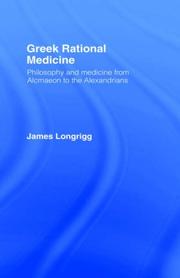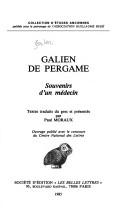| Listing 1 - 10 of 42 | << page >> |
Sort by
|

ISBN: 1134973675 1280331194 9786610331192 0203033442 0203328353 9780203328354 9780203033449 9780415025942 041502594X 041502594X 9781134973675 9781134973620 9781134973668 9780415861977 1134973667 Year: 1993 Publisher: London New York Routledge
Abstract | Keywords | Export | Availability | Bookmark
 Loading...
Loading...Choose an application
- Reference Manager
- EndNote
- RefWorks (Direct export to RefWorks)
The ancient Greek medical thinkers were profoundly influenced by Ionian natural philosophy. This philosophy caused them to adopt a radically new attitude towards disease and healing. James Longrigg shows how their rational attitudes ultimately resulted in levels of sophistication largely unsurpassed until the Renaissance. He examines the important relationship between philosophy and medicine in ancient Greece and beyond, and reveals its significance for contemporary western practice and theory.
Medicine, Greek and Roman. --- Medicine, Ancient. --- Ancient medicine --- Medicine --- Greek medicine --- Medicine, Roman --- Medicine, Unani --- Roman medicine --- Tibb (Medicine) --- Unani medicine --- Unani-Tibb (Medicine) --- Medicine, Ancient
Book
ISBN: 0190610441 9780190610449 9780190610456 019061045X 9780190610432 0190610433 Year: 2016 Publisher: Oxford New York, NY
Abstract | Keywords | Export | Availability | Bookmark
 Loading...
Loading...Choose an application
- Reference Manager
- EndNote
- RefWorks (Direct export to RefWorks)
There are few disciplines as exciting and forward-looking as medicine. Unfortunately, however, many modern practitioners have rather lost sight of the origins of their discipline. A Cabinet of Ancient Medical Curiosities aspires to make good this lapse by taking readers back to the early days of Western medicine in ancient Greece and Rome. Quoting the actual words of ancient authors, often from texts which have never been translated into English, it gives a glimpse into the beginnings of such fields as surgery, gynecology, pediatrics, preventive medicine, and pharmacology, as well as highlighting ancient views on such familiar topics as medical ethics and the role of the doctor in society.The hundreds of passages quoted from Greek and Roman authors give a vividly direct picture of the ancient medical world, a world in which, for example, a surgeon had to be strong-minded enough to ignore the screams of his patient, diseases were assumed to be sent by the gods, medicine and magic were often indistinguishable, donkeys might be brought into the sick-room to ensure a fresh supply of milk, human anatomy and microbes were equally mysterious, and no qualifications were required before setting up as a doctor.As will be evident from this list, the approach taken in the book is not an entirely serious one. Even so, despite its lighthearted approach, it does aspire, however modestly, to engage the reader in a thought provoking way about many of the issues still current in medicine nowadays.
Medicine, Greek and Roman. --- Medicine, Ancient. --- Ancient medicine --- Medicine --- Greek medicine --- Medicine, Roman --- Medicine, Unani --- Roman medicine --- Tibb (Medicine) --- Unani medicine --- Unani-Tibb (Medicine) --- Medicine, Ancient
Book
ISBN: 9783110355376 9783110362442 9783110377200 9783110362459 3110362457 3110362449 311035537X 3110377209 Year: 2014 Volume: part. I 3,1 Publisher: Berlin
Abstract | Keywords | Export | Availability | Bookmark
 Loading...
Loading...Choose an application
- Reference Manager
- EndNote
- RefWorks (Direct export to RefWorks)
Dieses Buch enthält die erste kritische Ausgabe der hippokratischen Schrift De humoribus (Über die Säfte), die auf allen bekannten Überlieferungsträgern beruht: So wurde neben verschiedenen griechischen Textzeugen auch eine arabische Übersetzung herangezogen, deren Verwendung aufgrund der problematischen Überlieferungssituation eine Edition eigentlich erst möglich machte. Eine deutsche Übersetzung des griechischen Textes sowie ausführliche Anmerkungen dienen außerdem dazu, das Verständnis dieses nicht immer ganz leicht zugänglichen Textes zu erleichtern.Die Schrift De humoribus hat die Forscher von der Antike bis in die Moderne vor große Probleme gestellt. Insbesondere die Tatsache, dass sie oftmals nur eine Aneinanderreihung von medizinischen Begriffen und Sätzen zu sein scheint, hat die Frage aufgeworfen, wer sie zu welchem Zweck verfasst hat. Eine genauere Untersuchung hat nun ergeben, dass sie das Ergebnis der Arbeit eines Arztes ist, der um 400 v. Chr. aus unterschiedlichen Quellen einzelne Notizen zusammengestellt hat, die ihm als Vorarbeit zu einer größeren Abhandlung dienten. The Hippocratic treatise De humoribus (On the Humors) has provided scholars from antiquity to the modern era with major interpretive problems. In particular, its general appearance as a series of medical terms and phrases has raised questions about its authorship and purpose. More detailed study has now shown it to be the work of a doctor from circa 400 BC, who created it from different sources and individual notes, which were preliminary work toward a larger treatise. This book presents the first critical edition of De humoribus based upon all known textual witnesses in both Greek and Arabic. It provides a German translation of the Greek Text with detailed notes to facilitate the interpretation of this often difficult text. The Introduction surveys information about the textual tradition and interpretive history of this work and discusses its structure, purpose, author, and date.
Medicine, Greek and Roman. --- Medicine, Ancient. --- Ancient medicine --- Medicine --- Greek medicine --- Medicine, Roman --- Medicine, Unani --- Roman medicine --- Tibb (Medicine) --- Unani medicine --- Unani-Tibb (Medicine) --- Medicine, Ancient --- Ancient medicine. --- Hippocrates. --- humoralism.
Book
ISBN: 3110406772 3110406594 9783110406771 9783110406597 3110405830 Year: 2014 Publisher: Berlin ; Boston : De Gruyter Akademie Forschung,
Abstract | Keywords | Export | Availability | Bookmark
 Loading...
Loading...Choose an application
- Reference Manager
- EndNote
- RefWorks (Direct export to RefWorks)
The present volume offers the first critical edition of Book I of the medieval Arabic translation of Galen's Commentary on the Hippocratic Epidemics produced by Hunayn ibn Ishaq (d. ca. 870). The edition is based on all extant Arabic textual witnesses, including the Arabic secondary transmission.The translation of this text became a crucial source for the development of medicine in the Islamic world, especially in the nascent field of clinical medicine; the number and extent of "ations in later Arabic medical works and the wide range of didactic writings created on the basis of this translation attest to its importance.The English translation, which aims to convey some of the favour of the Arabic translation, comes with extensive notes on the differences between the Greek original and the Arabic translation. A thorough comparison between the two versions of the commentary provided important insights into the translation style and terminology of Hunayn ibn Ishaq and his associates.
Medicine --- Medicine, Greek and Roman. --- Hippocrates. --- Greek medicine --- Medicine, Roman --- Medicine, Unani --- Roman medicine --- Tibb (Medicine) --- Unani medicine --- Unani-Tibb (Medicine) --- Basic medical science --- History and ethics of medicine. --- Medicine, Ancient --- Health Workforce --- Epidemics (Hippocrates) --- Epidemiorum libri (Hippocrates)
Book
ISBN: 9789004356771 9004356770 9004356770 9789004356764 9004356762 Year: 2017 Publisher: Leiden Boston
Abstract | Keywords | Export | Availability | Bookmark
 Loading...
Loading...Choose an application
- Reference Manager
- EndNote
- RefWorks (Direct export to RefWorks)
The Comparable Body - Analogy and Metaphor in Ancient Mesopotamian, Egyptian, and Greco-Roman Medicine explores how analogy and metaphor illuminate and shape conceptions about the human body and disease, through 11 case studies from ancient Mesopotamian, Egyptian, and Greco-Roman medicine. Topics address the role of analogy and metaphor as features of medical culture and theory, while questioning their naturalness and inevitability, their limits, their situation between the descriptive and the prescriptive, and complexities in their portrayal as a mutually intelligible medium for communication and consensus among users.
Medicine, Assyro-Babylonian. --- Medicine, Egyptian. --- Medicine, Greek and Roman. --- Greek medicine --- Medicine, Roman --- Medicine, Unani --- Roman medicine --- Tibb (Medicine) --- Unani medicine --- Unani-Tibb (Medicine) --- Medicine, Ancient --- Egyptian medicine --- Egyptians --- Assyro-Babylonian medicine --- Medicine

ISBN: 0191838241 1281346489 9786611346485 0191518352 9780191518355 9780198150657 0198150652 9780199277018 019927701X 9780191838248 019927701X 0198150652 Year: 2005 Publisher: Oxford [England] : New York : Clarendon Press ; Oxford University Press,
Abstract | Keywords | Export | Availability | Bookmark
 Loading...
Loading...Choose an application
- Reference Manager
- EndNote
- RefWorks (Direct export to RefWorks)
Pliny the Elder's fascination with the world around him resulted in his death in the eruption of Vesuvius in AD 79, but his Natural History was to remain influential for centuries after his death. Central to Pliny's thought was the relationship between man and nature, highlighted in his study of the human race in Book 7, where he ponders topics as diverse as monstrous races, sex changes, breech births and near-death experiences. This volume provides the first detailed. commentary on this key book, together with a translation and introduction, and highlights its interest and importance as a cul
Human physiology --- Medicine, Greek and Roman. --- Greek medicine --- Medicine, Roman --- Medicine, Unani --- Roman medicine --- Tibb (Medicine) --- Unani medicine --- Unani-Tibb (Medicine) --- Medicine, Ancient --- Human biology --- Medical sciences --- Physiology --- Human body
Book

ISBN: 1280597038 9786613626868 311916514X 311025980X 9783110259803 3110259796 9783110259797 9783110259797 9781280597039 6613626864 Year: 2012 Publisher: Berlin Boston
Abstract | Keywords | Export | Availability | Bookmark
 Loading...
Loading...Choose an application
- Reference Manager
- EndNote
- RefWorks (Direct export to RefWorks)
The Hippocratic Epidemics and Galen’s Commentary on them constitute milestones in the development of clinical medicine. But they also illustrate the rich exegetical traditions that existed in the post-classical Greek world. The present volume investigates these texts from various and diverse vantage points: textual criticism; Greek philology; knowledge transfer through translations; and medical history. Especially the Syriac and Arabic traditions of the Epidemics come under scrutiny.
Medicine, Greek and Roman. --- Medicine, Arab. --- Arab medicine --- Medicine, Arab --- Medicine, Arabic --- Medicine, Unani --- Tibb (Medicine) --- Unani medicine --- Unani-Tibb (Medicine) --- Medicine, Medieval --- Greek medicine --- Medicine, Roman --- Roman medicine --- Medicine, Ancient --- Hippocrates. --- Galen. --- Medical History.
Book

ISBN: 3110336332 3110389304 9783110336337 9783110389302 9783110333923 3110333929 Year: 2015 Publisher: Berlin Boston
Abstract | Keywords | Export | Availability | Bookmark
 Loading...
Loading...Choose an application
- Reference Manager
- EndNote
- RefWorks (Direct export to RefWorks)
Our understanding of science, mathematics, and medicine today can be deeply enriched by studying the historical roots of these areas of inquiry in the ancient Near East and Mediterranean. The fields of ancient science and mathematics have in recent years witnessed remarkable growth. The present volume brings together contributions from more than thirty of the most important scholars working in these fields in the United States and Europe in honor of the eminent historian of ancient science and medicine Heinrich von Staden, Professor Emeritus of Classics and History of Science at the Institute of Advanced Study and William Lampson Professor Emeritus of Classics and Comparative Literature at Yale University. The papers range widely from Mesopotamia to Ancient Greece and Rome, from the first millennium B.C. to the early medieval period, and from mathematics to philosophy, mechanics to medicine, representing both a wide diversity of national traditions and the cutting edge of the international scholarly community.
Medicine, Greek and Roman. --- Greek medicine --- Medicine, Roman --- Medicine, Unani --- Roman medicine --- Tibb (Medicine) --- Unani medicine --- Unani-Tibb (Medicine) --- Medicine, Ancient --- Von Staden, Heinrich, --- Staden, Heinrich von, --- History of mathematics. --- history of medicine.
Book
ISBN: 9048544432 9463724214 Year: 2020 Publisher: Amsterdam : Amsterdam University Press,
Abstract | Keywords | Export | Availability | Bookmark
 Loading...
Loading...Choose an application
- Reference Manager
- EndNote
- RefWorks (Direct export to RefWorks)
In Unani Medicine in the Making, Kira Schmidt Stiedenroth examines the contemporary institutions and practices of Graeco-Islamic healing in India. Drawing on interviews with practitioners, clinical observations, and Urdu sources, the book focuses on Unani's multiplicity, scrutinizing apparent tensions between the understanding of Unani as a system of medicine and its multiple enactments as Islamic medicine, medical science, or alternative medicine. Ethnographic details provide vivid descriptions of the current practices of Unani in India and invite readers to rethink the idea that humoral medicine is incommensurable with modern science. Ultimately, the book also discusses the relationship of Unani with Muslim communities, examining the growing practice of Prophetic Medicine in Urban India and the increasing representation of Unani as Islamic Medicine.
Medicine --- Medicine, Arab --- Medicine, Greek and Roman. --- Health Workforce --- Greek medicine --- Medicine, Roman --- Medicine, Unani --- Roman medicine --- Tibb (Medicine) --- Unani medicine --- Unani-Tibb (Medicine) --- Medicine, Ancient --- Unani medicine, ethnography, Asian medicine, practice ontology, Islamic medicine.

ISBN: 2251326278 9782251326276 2251915281 Year: 1985 Volume: 104 Publisher: Paris: Les Belles Lettres,
Abstract | Keywords | Export | Availability | Bookmark
 Loading...
Loading...Choose an application
- Reference Manager
- EndNote
- RefWorks (Direct export to RefWorks)
Galien (second siècle après J.-C.) fut un des plus grands médecins de l’Antiquité. Théoricien en même temps que praticien, il nous a laissé de très nombreux ouvrages scientifiques, où il traite de la médecine sous toutes ses formes ainsi que des disciplines apparentées. À maintes reprises, il y évoque incidemment des épisodes de sa carrière, qui se déroula en grande partie à Rome. Ce sont ces précieuses pages autobiographiques qui ont été traduites, annotées et replacées dans leur contexte. Elles intéresseront non seulement les médecins humanistes, mais aussi les historiens de la philosophie ancienne – car Galien se voulait philosophe en même temps que médecin – et, d’une manière plus générale, tous les lettrés que passionne la culture antique.
Medicine, Greek and Roman. --- Médecine grecque et romaine --- Galen --- Medicine, Greek and Roman --- Greek medicine --- Medicine, Roman --- Medicine, Unani --- Roman medicine --- Tibb (Medicine) --- Unani medicine --- Unani-Tibb (Medicine) --- Medicine, Ancient --- History of medicine --- Greek-roman --- 460bc-576ad --- 460bc-576ad. --- Médecine grecque et romaine --- Classics --- History --- History & Philosophy Of Science --- littérature grecque --- médecine grecque --- anthologie de textes --- médecine à Rome
| Listing 1 - 10 of 42 | << page >> |
Sort by
|

 Search
Search Feedback
Feedback About UniCat
About UniCat  Help
Help News
News